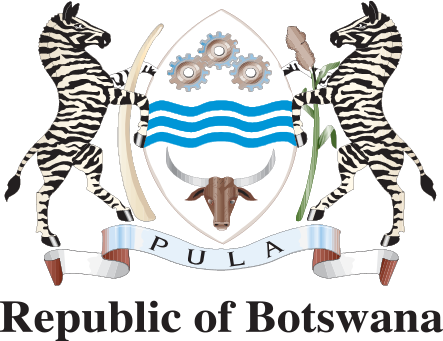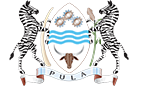The primary responsibility of the Ministry is to manage and coordinate Botswana’s foreign policy and advance the country’s national interests abroad. In pursuit of this important mandate, the Ministry works closely with other Ministries, and through its diplomatic representatives abroad (High Commissions and Embassies), to engage the international community in the interest of the country and its people. The Ministry derives its mandate from the Constitution of Botswana. Through Government Notice No. 356 of 2002, the Ministry’s mandate can be summarized as follows:
- Promote friendly relations with the international community with a view to establish and secure goodwill towards Botswana;
- Articulate and defend Botswana’s interests in the regional and international organizations;
- Develop bilateral frameworks to enhance the realization of Botswana’s foreign policy objectives;
- Cross sectoral co-ordination of matters with a bearing on foreign relations;
- Management of Diplomatic immunities and privileges
- Formulate and articulate Botswana’s foreign policy;
- Governance and the International Community;
- Major Communication channel between Botswana Government and the International Community;
- Promote and protect Botswana’s interests and its citizens abroad, and enhance Botswana’s security and prosperity;
- To promote favourable conditions for Botswana’s trade, foreign investments, tourism and to seek scientific, technological and cultural cooperation with other countries and institutions;
- Provision of service on behalf of other Government Ministries and Departments;
- Coordinates State and official visits by Heads of State; and
- State Protocol and State Functions
In essence, the role played by the Ministry is that of a facilitator, coordinator and custodian of Botswana’s foreign policy.
Ministry Departments:
- Department of Protocol and Consular Services
- Department of Africa and the Middle East
- Department of Asia and Pacific Affairs
- Department of Multilateral Affairs
- Department of Public Relations, Research and Information
- Department of Europe and Americas
- Department of Corporate Services
- 23 Missions (Embassies/High Commissions and Consulates) abroad: Pretoria, Johannesburg, Windhoek, Maputo, Harare, Lusaka, Nairobi, Addis Ababa, Kuwait, Canberra, New Delhi, Beijing, Tokyo, Brussels, Berlin, Stockholm, Geneva, London, Washington DC, New York, Abuja, Brasilia and Paris.
The organizational structure of the Ministry has developed progressively over the years, due to the changing global environment and increased responsibilities.
The Minister is the political head of the Ministry, whilst the Permanent Secretary is the Executive head. The leadership of the Ministry also includes the Deputy Permanent Secretary, Corporate Services; the Deputy Permanent Secretary, Bilateral Diplomacy; Deputy Permanent Secretary, Multilateral Diplomacy, Research and Policy Development and the Chief of Protocol. The Ministry works closely with the Office of the President.
- DEPARTMENT OF CORPORATE SERVICES
This Department is headed by the Deputy Permanent Secretary, who is assisted by the Senior Manager. The Department has an overall responsibility of coordinating, directing and controlling all management aspects of the Ministry. It provides general administrative and operational support for the activities of the Ministry and Botswana’s diplomatic missions.This includes Human Resource management, budgeting, supplies, financial management, training and administering conditions of services for the Foreign Service personnel and locally recruited staff at Botswana Missions abroad.
- DEPARTMENT OF PROTOCOL AND CONSULAR SERVICES
The Department is headed by the Chief of Protocol who is at Deputy Permanent Secretary Level. The Department is responsible for coordination of official functions including, facilitation of state/official visits by foreign Heads of State/Government and external visits by His Excellency the President of the Republic of Botswana. The Department also provides consular services to Batswana and Foreign Nationals. Furthermore, if facilitates the administration of privileges and immunities accorded to diplomats accredited to Botswana in accordance with the Diplomatic Immunities and Privileges Act and the Vienna Conventions on Diplomatic Relations and Consular Relations.
- DEPARTMENT OF AFRICA AND THE MIDDLE EAST
This Department is headed by the Director and is responsible for the promotion of relations between Botswana and the countries of Africa and the Middle East, as well as regional and continental organizations such as SACU, SADC and the African Union.
Botswana attaches great importance to the countries of Africa as strategic partners as their political and socio-economic development is intricately linked and mutually reinforcing.
- DEPARTMENT OF EUROPE AND THE AMERICAS
The Department is headed by the Director and is responsible for the promotion of relations between Botswana and the countries of Europe and the Americas as well as regional organizations such as European Union, ACP, etc. In this regard, Botswana, as a member of the African, Caribbean and Pacific (ACP) States, seeks to maximize the benefits of trade, economic and political relations with the European Union.
- DEPARTMENT OF PUBLIC DIPLOMACY, RESEARCH AND INFORMATION
The Department is headed by the Director and is responsible for information dissemination, articulating Botswana’s position concerning international issues and carrying out public diplomacy activities in order to project Botswana’s image. In this regard, the Department organizes press conferences for visiting Heads of States and other VIPs, arranges for press interviews for the Minister of Foreign Affairs and International Cooperation, issues the Ministry’s press releases, arranges and conducts fact finding tours on issues relating to Botswana’s image and foreign relations. It also manages the Ministry’s website. In short, the work of the Department entails information dissemination, public diplomacy and research.
- DEPARTMENT OF ASIA AND THE PACIFIC
The Department is headed by the Director and is responsible for promoting relations between Botswana and the countries of Asia and the Pacific as well as partnerships such as the Tokyo International Conference on the Development of Africa (TICAD) and the China - Africa Forum (FOCAC). The Department plays a strategic role in promoting and defending the interests of Botswana in Asia and the Pacific region.
- DEPARTMENT OF MULTILATERAL AFFAIRS
The Department is headed by the Director and is responsible for the promotion of Botswana’s relations with multilateral institutions/organizations such as the United Nations and its specialized agencies, Non-Aligned Movement, Commonwealth, and WTO. It also deals with governance issues and international treaties, conventions and protocols which Botswana is signatory to.
Botswana regards multilateral diplomacy as a key component of its foreign policy, primarily because, as a member of the community of nations, there has been a realization that challenges such national development, human rights violations, security, peace, disease control, and climate change, among others, are too vast and complex for one any country, no matter how powerful, to effectively manage on its own. Multilateralism thus remains the most effective forum in which, as a small country, Botswana has the opportunity to exert its influence on the international agenda.
- DIPLOMATIC MISSIONS ABROAD
The Ministry also discharges its mandate through its diplomatic missions abroad. Currently, Botswana has twenty-three (23) Missions, including one Consulate in Johannesburg. The Missions are distributed as follows:
The main functions of a diplomatic mission are outlined in Article 3 of the Vienna Convention on Diplomatic Relations (1961) as follows:
- representing the sending State in the receiving State.
- protecting in the receiving State the interests of the sending State and of its nationals, within the limits permitted by international law.
- negotiating with the Government of the receiving State.
- ascertaining by all lawful means conditions and developments in the receiving State, and reporting thereon to the Government of the sending State.
- promoting friendly relations between the sending State and the receiving State, and developing their economic, cultural and scientific relations.

